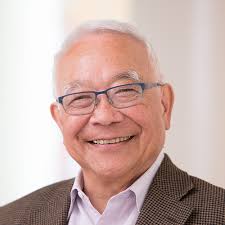
Dr. Keith R. Yamamoto is Vice Chancellor for Science Policy and Strategy, Director of Precision Medicine, and professor of cellular and molecular pharmacology at UCSF.
After earning his PhD from Princeton University, Yamamoto joined the UCSF faculty in 1976, where he has been an international leader in the investigation of transcriptional regulation by nuclear receptors, which mediate the actions of essential hormones and cellular signals; he uses mechanistic and systems approaches to pursue these problems in pure molecules, cells and whole organisms.
He has led or served on numerous national committees focused on public and scientific policy, public understanding and support of biological research, and science education; he chairs the Coalition for the Life Sciences and sits on the National Research Council Governing Board Executive Committee, serves as vice chair of the National Academy of Medicine’s Executive Committee and Council, and is a member of the National Academy of Sciences Division of Earth and Life Studies Advisory Committee, the Board of Directors and Executive Committee of Research!America and the Advisory Board for Lawrence Berkeley National Laboratory.
As Chair of the NAS Board on Life Sciences, he created the study committee that produced “Toward Precision Medicine: Building a Knowledge Network for Biomedical Research and a New Taxonomy of Disease“, the report that enunciated the precision medicine concept, and he has helped to lead efforts in the White House, in Congress, in Sacramento and at UCSF to implement it.
He has chaired or served on many committees that oversee training and the biomedical workforce, research funding, and the process of peer review and the policies that govern it at NIH. He was elected to the National Academy of Sciences, the National Academy of Medicine, the American Academy of Arts and Sciences, and the American Academy of Microbiology, and is a fellow of the American Association for the Advancement of Science.
Alternate Member
OPEN
